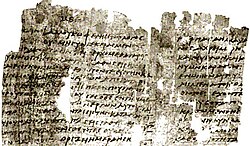
Matthew 19 is the nineteenth chapter in the Gospel of Matthew in the New Testament section of the Christian Bible. The book containing this chapter is anonymous, but early Christian tradition uniformly affirmed that Matthew composed this Gospel. Jesus commences his final journey to Jerusalem in this chapter, ministering through Perea. It can be seen as the starting point for the passion narrative.

1 Peter 2 is the second chapter of the First Epistle of Peter in the New Testament of the Christian Bible. The author identifies himself as "Peter, an apostle of Jesus Christ" and the epistle is traditionally attributed to Peter the Apostle, but some writers argue that it is the work of Peter's followers in Rome between 70 and 100 CE.

Revelation 1 is the first chapter of the Book of Revelation or the Apocalypse of John in the New Testament of the Christian Bible. The book is traditionally attributed to John the Apostle, but the precise identity of the author is a point of academic debate. This chapter contains the prologue of the book, followed by the vision and commission of John.
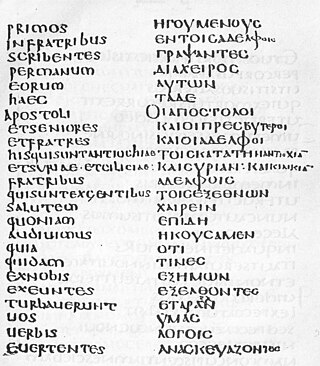
Acts 7 is the seventh chapter of the Acts of the Apostles in the New Testament of the Christian Bible. It records the address of Stephen before the Sanhedrin and his execution outside Jerusalem, and introduces Saul. The book containing this chapter is anonymous, but early Christian tradition uniformly affirmed that Luke composed this book as well as the Gospel of Luke.

Ephesians 1 is the first chapter of the Epistle to the Ephesians in the New Testament of the Christian Bible. Traditionally, it is believed to have been written by Apostle Paul while he was in prison in Rome, but more recently, it has been suggested that it was written between AD 80 and 100 by another writer using Paul's name and style. This chapter contains the greeting, followed by a section about "The Blessing of God" and Paul's prayer.

Ephesians 4 is the fourth chapter of the Epistle to the Ephesians in the New Testament of the Christian Bible. Traditionally, it is believed to have been written by Apostle Paul while he was in prison in Rome, but more recently, it has been suggested that it was written between AD 80 and 100 by another writer using Paul's name and style. This chapter is a part of Paul's exhortation, with the particular section about the mutual interdependence of the Christians as the church and how they should live in the world (4:17–5:20).

Hebrews 1 is the first chapter of the Epistle to the Hebrews in the New Testament of the Christian Bible. The author is anonymous, although the internal reference to "our brother Timothy" causes a traditional attribution to Paul, but this attribution has been disputed since the second century and there is no decisive evidence for the authorship. This chapter contains the introduction ('exordium') about God's final revelation ('word') through his son and how the son is superior to angels.

Hebrews 2 is the second chapter of the Epistle to the Hebrews in the New Testament of the Christian Bible. The author is anonymous, although the internal reference to "our brother Timothy" causes a traditional attribution to Paul, but this attribution has been disputed since the second century and there is no decisive evidence for the authorship. This chapter contains the implications for responding to God's Son, the Son's subjection and glorification, to the believers' benefits.
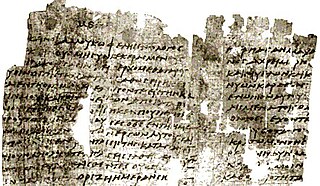
Hebrews 4 is the fourth chapter of the Epistle to the Hebrews in the New Testament of the Christian Bible. The author is anonymous, although the internal reference to "our brother Timothy" causes a traditional attribution to Paul, but this attribution has been disputed since the second century and there is no decisive evidence for the authorship. This chapter contains the admonition to press on toward 'God's Rest' and a reflection on the power of God's Word.

Hebrews 5 is the fifth chapter of the Epistle to the Hebrews in the New Testament of the Christian Bible. The author is anonymous, although the internal reference to "our brother Timothy" causes a traditional attribution to Paul, but this attribution has been disputed since the second century and there is no decisive evidence for the authorship. This chapter contains the exposition about the merciful Christ and the High Priests, followed by an exhortation to challenge the readers beyond the elementary catechism.

Hebrews 6 is the sixth chapter of the Epistle to the Hebrews in the New Testament of the Christian Bible. The author is anonymous, although the internal reference to "our brother Timothy" causes a traditional attribution to Paul, but this attribution has been disputed since the second century and there is no decisive evidence for the authorship. This chapter contains the admonition to progress and persist in faithfulness.

Hebrews 7 is the seventh chapter of the Epistle to the Hebrews in the New Testament of the Christian Bible. The author is anonymous, although the internal reference to "our brother Timothy" causes a traditional attribution to Paul, but this attribution has been disputed since the second century and there is no decisive evidence for the authorship. This chapter contains the exposition about the superiority of Christ's Priesthood through Melchizedek to the Levitical Priesthood.

Hebrews 8 is the eighth chapter of the Epistle to the Hebrews in the New Testament of the Christian Bible. The author is anonymous, although the internal reference to "our brother Timothy" causes a traditional attribution to Paul, but this attribution has been disputed since the second century and there is no decisive evidence for the authorship. This chapter contains the exposition about the better ministry of the New Covenant.

Hebrews 9 is the ninth chapter of the Epistle to the Hebrews in the New Testament of the Christian Bible. The author is anonymous, although the internal reference to "our brother Timothy" causes a traditional attribution to Paul, but this attribution has been disputed since the second century and there is no decisive evidence for the authorship. This chapter contains the exposition about the ministry of the first covenant and Christ's effective sacrifice.

Hebrews 10 is the tenth chapter of the Epistle to the Hebrews in the New Testament of the Christian Bible. The author is anonymous, although the internal reference to "our brother Timothy" causes a traditional attribution to Paul, but this attribution has been disputed since the second century and there is no decisive evidence for the authorship. This chapter contains the exposition about Christ's effective sacrifice and the exhortation to continue in faithfulness and expectancy.

Hebrews 11 is the eleventh chapter of the Epistle to the Hebrews in the New Testament of the Christian Bible. The author is anonymous, although the internal reference to "our brother Timothy" causes a traditional attribution to Paul, but this attribution has been disputed since the second century and there is no decisive evidence for the authorship. This chapter contains the exposition about the examples of faith's effective expression.

Hebrews 12 is the twelfth chapter of the Epistle to the Hebrews in the New Testament of the Christian Bible. The author is anonymous, although the internal reference to "our brother Timothy" causes a traditional attribution to Paul, but this attribution has been disputed since the second century and there is no decisive evidence for the authorship. This chapter contains the call to respond gratefully and nobly to God's invitation.
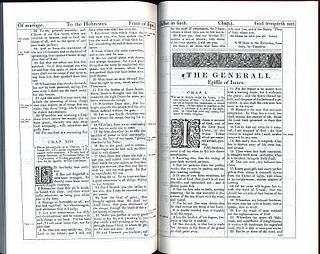
Hebrews 13 is the thirteenth chapter of the Epistle to the Hebrews in the New Testament of the Christian Bible. The author is anonymous, although the internal reference to "our brother Timothy", caused a traditional attribution to Paul. This attribution has been disputed since the second century, and there is no decisive evidence for the authorship. This closing chapter contains the author's concluding exhortations, final benediction and epistolary postscript.

Revelation 15 is the fifteenth chapter of the Book of Revelation or the Apocalypse of John in the New Testament of the Christian Bible. The book is traditionally attributed to John the Apostle, but the precise identity of the author remains a point of academic debate. This chapter includes the hymn of Moses and the Lamb and introduces the seven angels who appear with seven plagues.
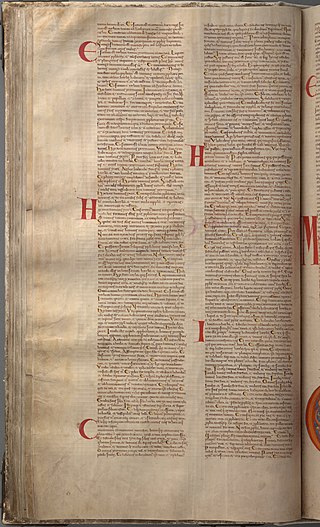
Zechariah 12 is the twelfth of the 14 chapters in the Book of Zechariah in the Hebrew Bible and the Old Testament of the Christian Bible. This book contains the prophecies attributed to the prophet Zechariah, and is a part of the Book of the Twelve Minor Prophets. This chapter is a part of a section consisting of Zechariah 9–14. This chapter and chapter 13 verses 1–6 are a section, forming a three-section "entity" with 13:7–9 and 14:1-21.
